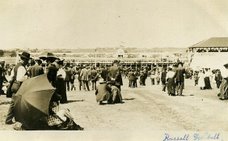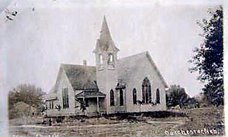In 1881, when Dorchester was officially incorporated, Dorchester had two grain elevators. The drought of the 1890s, however, reduced that number to just one elevator a decade later. In the late 1910s and early 1920s, soaring land prices and plummeting grain prices brought the expanding farm economy to an abrupt halt. The 1920 Dorchester Farmers Cooperative had an operational loss of $3,203 -- the only year with a net loss in the history of the company.
Despite some lean years, the cooperative survived and later thrived. The 1940s and 1960s brought massive expansion to Dorchester's grain storage facilities.
Today, the elevator and its storage bins dominate the Dorchester skyline. Farmers Cooperative serves as an economic hub for the area, and is comprised of sepearte energy, grain, feed, and agronomy departments. While its corporate office is in Dorchester, Farmers Cooperative owns facilities in 35 other communities, including DeWitt, Milford, Swanton, Tobias, Western and Wilber. Total operating revenues are estimated at $12.5 million, according to the cooperative Web site.
Dorchester's grain storage facilities and farmers cooperative have certainly come a long way. We are proud of the contribution that our cooperative and its producer members make to our town and local economy. Let's not take for granted the struggles endured to get where we are in 2007.

Dorchester's earliest elevators, circa 1885.
The J.R. Clark elevator pictured in 1908.
The fire at the east elevator in the 1950s.
Ariel view of the Co-op, 1950s.
Today's Farmers Cooperative in Dorchester.






















































Dorchester is lucky to have such a well-run business to contribute to the local tax base.
ReplyDeletedorchester would be nothing if it wasnt for the coop. they contribute to every business in town. our town would be nothing without it.
ReplyDeleteMy Dad, Frank Bosak, was very proud of the Farmers Co-op and of what it has become. The growth of the facility began under his managership and continued to the present day. He was especially proud of the farmers that believed in him and in the potential and put up the money to get things going in the late 40's and early 50's.
ReplyDelete